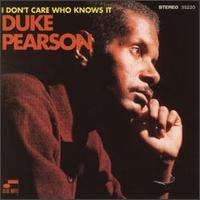I Don't Care Who Knows It
I Don't Care Who Knows It is an album by American pianist and arranger Duke Pearson featuring performances recorded between 1968 and 1970.[1] The album was released on the Blue Note label in 1996.
| I Don't Care Who Knows It | ||||
|---|---|---|---|---|
 | ||||
| Studio album by | ||||
| Released | 1996 | |||
| Recorded | June 24, 1968, May 5, October 3 and November 21, 1969 and February 13, 1970 | |||
| Studio | Van Gelder Studio, Englewood Cliffs, New Jersey and A & R Studios, New York City | |||
| Genre | Jazz | |||
| Length | 59:39 | |||
| Label | Blue Note | |||
| Duke Pearson chronology | ||||
| ||||
Reception
The Allmusic review by Stephen Thomas Erlewine awarded the album 4 stars stating "the music swings with an understated funk, with the band alternating between standard hard-bop and mellow, soulful grooves. On the whole, I Don't Care Who Knows It is fairly uneven — the sessions don't set well together, but work well as individual sets. Nevertheless, there is enough good material here to make it worthwhile for soul-jazz, Latin-jazz and, especially, Pearson aficionados".[2]
| Review scores | |
|---|---|
| Source | Rating |
| Allmusic | |
Track listing
- All compositions by Duke Pearson except as indicated
- "I Don't Care Who Knows It" (Buddy Johnson) - 3:10
- "Bloos" - 7:38
- "A Beautiful Friendship" (Donald Kahn, Stanley Styne) - 6:37
- "Horn In" (Frank Foster) - 5:51
- "Canto Ossanha" (Baden Powell, Vinicius de Moraes) - 6:36
- "Xibaba" (Airto Moreira) - 6:32
- "I Don't Know" (Moreira) - 7:00
- "Once I Loved (O Amor en Paz)" (Antônio Carlos Jobim) - 5:22
- "Upa, Neguinho" (Edú Lobo, Gianfrancesco Guarnieri) - 1:57
- "Captain Bicardi" (Antônio Carlos Jobim) - 5:40
- "Theme from Rosemary's Baby" (Krzysztof Komeda) - 3:16
- Recorded at Rudy Van Gelder Studio, Englewood Cliffs, NJ on June 24, 1968 (track 11), May 5, 1969 (track 9) and February 13, 1970 (tracks 1-5) and at A & R Studios, New York City on October 3, 1969 (tracks 6 & 8) and November 21, 1969 (tracks 7 & 10).
Personnel
- Duke Pearson - piano, electric piano, arranger
- Burt Collins - trumpet (tracks 1-6 & 8)
- Kenny Rupp - trombone (tracks 1-5)
- Jerry Dodgion - flute, alto flute, alto saxophone (tracks 1-8, 10 & 11)
- Al Gibbons - flute (tracks 6 & 8)
- Lew Tabackin - tenor saxophone, flute (tracks 1-5, 7 & 10)
- Frank Foster - tenor saxophone, alto clarinet (tracks 1-5)
- Bobby Hutcherson - vibes (tracks 6-8, 10 & 11)
- Sam Brown (track 11), Ralph Towner (tracks 7 & 10) - acoustic guitar
- Dorio Ferreira - guitar, percussion (track 9)
- Al Gafa (tracks 6-8 & 10), Wally Richardson (tracks 7 & 10) - guitar
- Bob Cranshaw - bass (tracks 6-8, 10 & 11)
- Ron Carter - bass (tracks 1-5)
- Bebeto Jose Souza - bass (track 9)
- Mickey Roker - drums (tracks 1-8, 10 & 11), percussion (track 9) [3]
- Airto Moreira - percussion, vocals (track 5-8, & 10), drums (track 9) [4]
- Stella Mars - vocals (track 8)
- Andy Bey - vocals (track 1)
- Flora Purim - vocals (track 9) [5]
gollark: My existing mine is to be renamed Mine 0. I build Mine 1, 2 and 3.
gollark: It has, I believe, been two hours since I built and used mine.
gollark: I will now smelt an iron ore™ into an iron™.
gollark: I am now going to smelt an other iron ore because this is all manual ææææ.
gollark: I am now going to use my furnace to smelt an iron ore. Mwahahahaha.
References
- Duke Pearson discography accessed September 10, 2010
- Erlewine, S. T. Allmusic Review accessed September 10, 2010
- http://www.jazzdiscography.com/Artists/Pearson/dp-disc.php
- http://www.jazzdiscography.com/Artists/Pearson/dp-disc.php
- http://www.jazzdiscography.com/Artists/Pearson/dp-disc.php
This article is issued from Wikipedia. The text is licensed under Creative Commons - Attribution - Sharealike. Additional terms may apply for the media files.